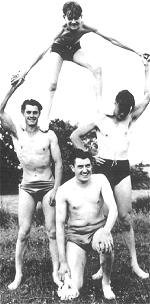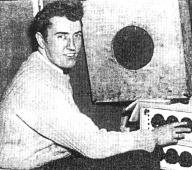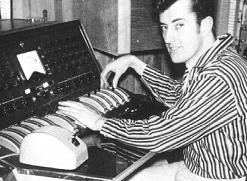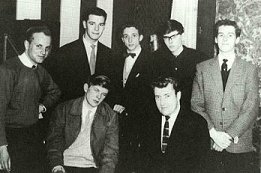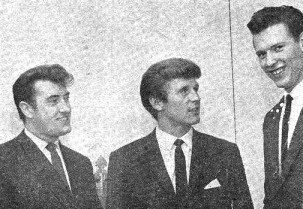|
Early Years |
|||
|
Joe Meek was Britain's first independent record producer, and one of the first in the world to receive recognition as such. Before Joe struck out on his own against the ridiculous constraints of the British recording industry of the time, there were hardly any true independent record producers, with their own studios, writers, artists signed directly to themselves, publicity control and so on. Even Phil Spector hired space and time in major recording studios and employed freelance session musicians; Norman Petty was possibly the only comparable producer with any kind of fame. Previously, there were a few scattered indies in the US, such as Benny Bell in the 1940's, but nobody who really made much of a mark on the history of the music business. |
|||
|
Clowning with friends in Newent |
Joe Meek was born Robert Joe Meek in Newent, Gloucestershire, England on April 5th 1929. A quiet, creative child, he already knew by the time he was eight or nine that he wanted to do something with sound and electronics. Despite a serious childhood accident, in which Joe almost destroyed his hands while innocently playing with some dangerous chemicals discarded after wartime operations - they exploded, leaving him with third degree chemical burns - he experimented continually with anything he could find laying around. Before he was ten, he had discovered that yelling close to the pick up of a gramophone during the run off grooves produced a faintly audible recording there, and around the same time he constructed a short wave radio out of junked parts. He made his first recording in his early teens - an acetate of brother Eric's girlfriend singing a currently popular dance tune. By the time he was 14, he had built a television set from scratch; the only problem was that the stations weren't broadcasting as far West as Newent, but at least they were ready for it when it did! |
||
|
After doing his National Service as a radar technician, Joe moved to London in the mid-1950's. At first he took odd jobs at TV repair shops, but very shortly found his way to being a junior engineer for studios such as IBC and a travelling chief technician on location with popular entertainment shows such as "People Are Funny". In 1956 IBC big shot Denis Preston offered him the opportunity to work at a new studio at Lansdowne House in Holland Park. Joe made many recordings there with British jazz legends such as Chris Barber, Acker Bilk and Humphrey Lyttleton, and even designed the mixing desk in the control room. Despite his junior status, Joe had far more influence than might be expected, and in fact did a lot of what is better described as production on records he was only credited as engineer for. |
On location for Radio Luxembourg |
||
|
His inventiveness and brilliance notwithstanding, he was constrained by the industry set up - controls were to be pre-set and not touched, engineers were to wear white coats - except on Saturdays, when they might wear a sports jacket if they preferred - and was making a few enemies of other engineers and producers, who were reduced to sitting around idle while the performers and musicians requested Joe for their sessions. By the late 1950's, Joe had already accumulated a great deal of recording equipment of his own and, in his tiny three room ground floor apartment not far from Lansdowne, was providing rehearsal space for well known artists, recording songs of his own and working with other then-unknown artists who he would meet at local concerts or even busking along the Underground railway system. He would give anyone an opportunity that he felt showed some promise; and said promise might not even be great musical talent. Joe had an uncanny knack of spotting "image" a mile off and later on was to turn a few incredible tricks with young singers who had little more than a great appearance to commend them. In 1959 he embarked on his most ambitious project to date, a concept recording of how he thought life on the moon might be, the images being conjured up with sound instead of pictures. Limited only by his equipment, he nevertheless created what is probably the first full stereo concept album, and while some of the sounds are no doubt not what he heard in his mind, a few of the tracks do impart some quite startling visual images. |
|||
|
In the hot seat at Lansdowne |
With young trad jazzers Chris & The Students |
||
|
Around the turn of the decade, he began work on what was to become his home and studio until his death in 1967. He rented a three-floor apartment about a small leather goods shop in North London's Holloway Road, and drafted in carpenter friend and singer Dave Adams (half of the boy-girl duo Joy & Dave) as construction manager. Within a few months, 304 Holloway Road, London N7 was the home of RGM Sound Ltd. For the first six months of the company's existence, Joe had his own record company, Triumph records, in partnership with one Major Banks of Saga Records, but the difficulties of making Banks release what Joe considered adequate money for equipment or publicity proved too much. Their first major hit, "Angela Jones" by Michael Cox, stalled at the starting gate because the pressing company couldn't manufacture enough records to keep up with demand on the budget they had, and by July 1960, he had ditched Triumph to become Britain's first true independent producer, at the ripe old age of 31. In a huge flash of foresight, and to Major Bank's abject horror when he found out, Joe had signed all Triumph's new artists to a private contract with himself, instead of to Triumph, and not only did Triumph/Saga lose the country's most in-demand young techie, it lost all its decent pop artists at the same time. |
|||
|
With John Leyton and "Johnny Remember me" whizzkid arranger Charles Blackwell. Geoff Goddard is presumably off somewhere writing more hit records. |
In 1961, Joe hit No. 1 all over Europe for the first time with a song called "Johnny Remember Me", composed by a promising young writer named Geoff Goddard, a classically trained pianist whom Joe had originally intended to market as a performer. The song was an echo-drenched tragedy featuring a young lover lamenting his dead love, and was sung by John Leyton, a pretty young actor who really had no intention of becoming a singer. His acting manager, Robert Stigwood, had approached Joe when one of Leyton's TV roles required him to play the part of a singer. Stigwood presumably knew of Meek's reputation for turning out high-quality material very quickly, and as they had something like a week to write and record a completely new and original song, Meek and Goddard got the job. |
||
|
"Johnny Remember Me" was featured three times during the course of the TV show and record shops were instantly deluged with orders for a record that hadn't even existed a week previously. This time, they selected a pressing plant, which could keep up with demand, and Joe - and John Leyton - had an unexpected monster on their hands. "Johnny Remember Me" sounded like nothing that had come before, and even today stands up as an exceptional record - there really hasn't been anything like it since. Although Joe never managed to repeat the trick with John Leyton, Leyton nonetheless had a couple more hits and several chart records before departing for Hollywood to become a respectably well known lead and character actor. |
|||
